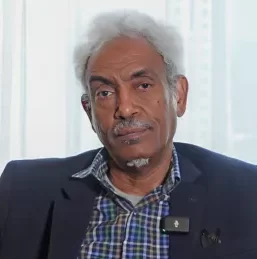We and Al-Burhan

Amin Hassan Omar
He said:
What is your problem with the man, or rather, what is his problem with you?
I said:
His problem with us is something he should answer for. Maybe he has no problem with us, but he is merely investing!
He said:
And what does that mean?
I said:
He does not address us directly, but rather speaks to others who may or may not listen to what he says—just as he does not hear what we say!
He said:
And what is your problem with him?
I said:
We have no problem with him except that he should understand that he is neither the giver nor the withholder. One who offers his life in sacrifice knows that only God is the giver and the withholder.
He said:
What do you mean by that?
I said:
The man believes that what is permissible for others is not permissible for us. If armed movements or groups in the east or west overstep in their speech, there is no blame or criticism. But if some of us merely express an opinion, it is seen as provocation and antagonism. This is a double standard that we do not accept. What is allowed for others should be allowed for us. Moreover, he treats us with the doctrine of the Murji’ah, expecting us to wait for elections before we can speak or express opinions. Even though we have said we do not seek power or participation in the transitional government, we are still expected to remain silent about matters that shape our path and destiny during this transitional period. Naturally, we will not accept being silenced, even if they label our opinions as provocation—whether they do so openly or not.
He said:
And then what?
I said:
Perhaps the man wants to extend his stay in the presidential seat and believes that such an extension will not please us. And he is right—it will not please us. We do not want a prolonged transitional government without an electoral mandate, as it will inevitably lead to conflicts and tensions sooner or later. However, the duration of the transitional period should be determined by realities on the ground, not by our wishes or the wishes of his group.
He said:
And what are these determining factors?
I said:
First, the completion of the liberation phase—how long it will take is unknown. And we are not just talking about liberating the capital but the entire country from the presence and threat of militias. This is beyond our control. We call it the liberation phase, not the foundational phase, and no one can set a fixed timeline for it, as it depends on the tasks involved.
He said:
And then what?
I said:
After that comes a transitional phase that should not exceed a year. This period should be used to prepare for elections and organize them to elect a Constituent Assembly responsible for drafting the constitution and forming a government with a popular mandate to rebuild the country’s infrastructure after the war.
He said:
What prevents you from discussing these issues with the man?
I said:
Perhaps he does not want to be seen engaging with us in a scene that those who hold a veto against us would disapprove of. He may also not want news of a covert meeting with us to leak. But we, like all other political forces—indeed, we are the strongest among them—must be included in political consultations. While he consults with all political factions, we are the largest group among them. We will not accept being treated as an exception just so that others do not perceive him as being aligned with us!
He said:
Does he fear being seen as part of your group?
I said:
Others—states, parties, and factions—use this notion to marginalize us and keep us in the shadows, isolating us from the sphere of influence. This is no secret. Even when things were arranged between him and his former deputy, and that deputy was far more hostile toward us—conspiring against us and obediently following external orders against us—he was still the most eager to meet and communicate with us. Meanwhile, Al-Burhan placed barriers, obstacles, and fortifications between us, even for the sake of mere conversation.
He said:
Why would he do that?
I said:
The answer lies with him, not with me. But perhaps he thinks we hold a grudge against him, whereas he does not realize that those accustomed to leadership and command do not harbor grudges. The true leader of a people does not bear resentment.
He said:
And what is your stance now?
I said:
Our stance is dictated by reality. The reality is that he is the leader of the institution, and the institution is the shield and defense of the nation. We have aligned ourselves with the institution and stand with it in the trenches—not in the hotels, as others do. We will continue on this path and will not change it out of provocation. Whether we like it or not, in this situation, we are bound by obedience in both ease and hardship to the institution and its leaders until the crisis in the country is resolved.
He said:
And then what? Is there a way out of this situation?
I said:
The way out of all these doubts and suspicions is open and frank dialogue without evasion or ambiguity. If that happens, then there is a way forward. But regardless, we will move forward relying on ourselves, with confidence and trust in God. We are not concerned about those who oppress or betray us, for one who stands with God has no need for the love or support of any righteous or wicked person. And God is the best of supporters.



